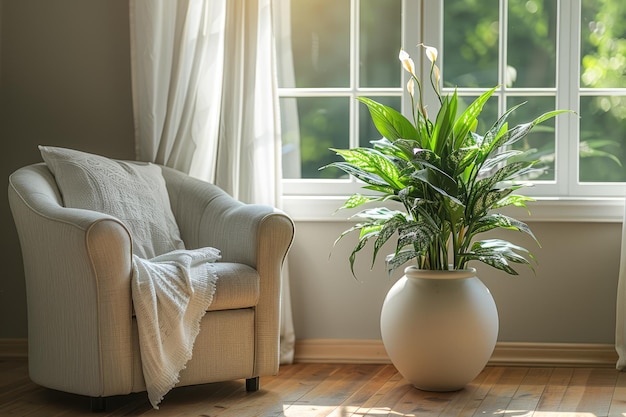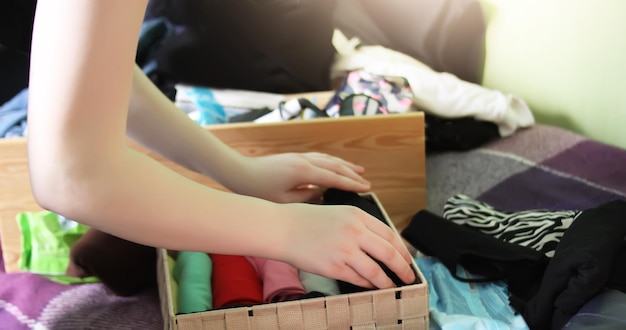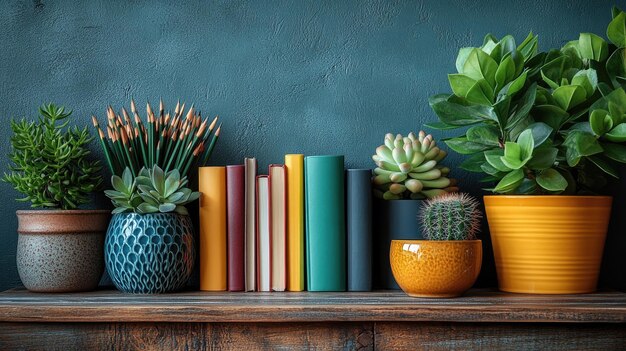Declutter Your Home in 7 Days: Minimalist Guide for 2025

Decluttering your home in 7 days is achievable with a strategic plan focusing on mindset, targeted decluttering methods, and creating minimalist habits for a more organized and peaceful living space in 2025. Using these strategies can drastically transform your home into a haven of sustainability.
Ready to transform your living space? Discover how to declutter your home in 7 days: a 2025 guide to a minimalist lifestyle, designed to help you create a clutter-free and serene environment.
Understand the Minimalist Mindset
Adopting a minimalist mindset is the first step. This isn’t just about getting rid of stuff; it’s about intentionally focusing on what truly adds value to your life.
Minimalism encourages conscious consumption and appreciation for experiences over possessions.
Question Your Attachment
Ask yourself why you’re holding onto certain items. Are they serving a purpose, or are they just taking up space due to sentimental value or fear of future need?
Define Your Minimalist Goals
What do you hope to achieve through decluttering? A calmer home, more free time, reduced stress? Defining your goals will keep you motivated throughout the process.
- Focus on Value: Only keep items that add real value to your life.
- Challenge Sentimental Attachment: Evaluate if the sentimental value outweighs the item’s utility.
- Visualize Your Ideal Space: Imagine your home clutter-free and organized.

By redefining your understanding of ‘enough,’ you’ll find it easier to part with unnecessary items and create a more peaceful and functional living space.
Day 1: Tackle the Wardrobe
Your wardrobe is a great place to start. It’s a contained space, and the results are immediately visible. A well-organized wardrobe can simplify your daily routine too.
Start by taking everything out and creating three piles: keep, donate/sell, and discard.
The One-Year Rule
If you haven’t worn an item in the past year, it’s likely you won’t wear it again. Be honest with yourself and let it go.
Consider the Fit and Style
Does the item fit you well and match your current style? If not, it’s time to say goodbye. Don’t hold onto clothes “just in case.”
- Be Ruthless with Yourself: Honesty is key to effective decluttering.
- Try Everything On: Ensure items fit and flatter you.
- Donate or Sell Gently Used Items: Give your unwanted clothes a new life.
Decluttering your wardrobe is not just about clearing space; it’s about refining your personal style and making it easier to get dressed each day.
Day 2: Conquer the Kitchen
The kitchen is often a clutter hotspot. From expired food to unused gadgets, it’s easy for things to accumulate. A clean kitchen promotes healthier eating habits as well.
Start by clearing out your pantry, fridge, and drawers, discarding anything you don’t need or use.
Check Expiration Dates
Toss out anything that’s past its expiration date. This includes food, condiments, and spices.
Evaluate Gadgets and Utensils
Do you really need that avocado slicer or the ice cream maker you’ve used once? Sell or donate items that aren’t essential.
- Organize Food Storage: Use clear containers to easily see what you have.
- Streamline Utensils and Cookware: Keep only what you frequently use.
- Clean as You Go: Maintain a clean and organized kitchen daily.
A decluttered kitchen is not just more functional; it’s also a more inviting space to prepare meals and spend time with family and loved ones.
Day 3: Organize the Living Room
The living room should be a relaxing haven, not a cluttered mess. Clear out unnecessary decor, books, and electronics to create a more serene atmosphere.
Focus on creating a cozy yet minimalist space that promotes relaxation and conversation.
Declutter Decor
Remove excess decorations, such as knick-knacks, picture frames, and vases. Keep only items that you truly love and that contribute to the room’s aesthetic.
Organize Media and Electronics
Consolidate your media collection and get rid of any outdated electronics or cables. Consider digital alternatives to reduce physical clutter.
- Simplify Furniture: Opt for functional and minimalist pieces.
- Create Storage Solutions: Use baskets, shelves, and cabinets to keep clutter out of sight.
- Regularly Tidy Up: Spend a few minutes each day decluttering surfaces.

A well-organized living room can become the heart of your home, where you can unwind, entertain guests, and create lasting memories.
Day 4: Streamline the Bathroom
The bathroom is another area prone to clutter. From old makeup to unused toiletries, it’s easy for things to accumulate. A clean bathroom can promote a sense of calm and well-being.
Clear out expired products, consolidate duplicates, and organize your essentials.
Toss Expired Products
Check expiration dates on makeup, skincare, and other toiletries. Expired products can harbor bacteria and cause skin irritation.
Consolidate and Organize
Combine duplicate products and organize your essentials in drawers, shelves, or containers. Use drawer dividers to keep things tidy.
- Use Vertical Space: Install shelves or organizers to maximize storage.
- Keep Surfaces Clear: Minimize items on countertops.
- Regularly Disinfect: Maintain a clean and hygienic bathroom environment.
A streamlined bathroom can become your personal sanctuary, where you can pamper yourself and start each day feeling refreshed.
Day 5: Declutter Home Office/Study Area
If you have a home office or study area, it’s crucial to keep it organized and clutter-free. A tidy workspace promotes focus and productivity.
Sort through papers, books, and supplies, and create a system for managing documents.
Go Paperless
Scan important documents and store them digitally. Reduce paper clutter by opting for online billing and statements.
Organize Supplies
Keep only essential supplies on your desk and store the rest in drawers or cabinets. Declutter pens, notebooks, and other stationery items.
- Designate Zones: Create specific areas for different tasks.
- Invest in Ergonomic Furniture: Ensure your workspace is comfortable and supports good posture.
- Regularly Back Up Data: Protect your digital files with regular backups.
A decluttered home office or study area can become your productive hub, where you can focus, create, and achieve your goals.
Day 6: Digitize and Organize Documents
In today’s digital age, it’s essential to digitize and organize your documents. This not only saves space but also makes it easier to find important information when you need it.
Scan, label, and store your documents securely online.
Choose a Scanning App
Select a scanning app or device that suits your needs. Many smartphones have built-in scanning capabilities.
Create a Digital Filing System
Organize your digital documents into folders and subfolders. Use clear and consistent naming conventions to make it easy to search for specific files.
- Back Up Your Files: Store your digital documents on a secure cloud storage service or external hard drive.
- Shred Sensitive Documents: Protect your personal information by shredding any documents that contain sensitive data before discarding them.
- Regularly Review and Update: Keep your digital filing system up to date by reviewing and deleting unnecessary files regularly.
Digitizing and organizing your documents can provide peace of mind, knowing that your important information is safe, accessible, and well-organized.
Day 7: Maintain and Reflect
Decluttering is not a one-time event; it’s an ongoing process. Take time to reflect on your progress and create habits to maintain your clutter-free home.
Establish routines for tidying up, and make conscious decisions about what you bring into your home.
The One-In, One-Out Rule
For every new item you bring into your home, discard or donate an old one. This helps prevent clutter from accumulating.
Regular Tidy-Up Sessions
Set aside a few minutes each day or week to tidy up and declutter. This prevents clutter from building up and makes it easier to maintain a clean and organized home.
- Practice Conscious Consumption: Be mindful of your purchases and avoid impulse buys.
- Embrace Imperfection: Don’t strive for perfect minimalism; focus on creating a home that works for you.
- Celebrate Your Progress: Acknowledge your accomplishments and enjoy the benefits of a clutter-free life.
| Key Point | Brief Description |
|---|---|
| 🧹 Declutter Strategy | Follow a step-by-step approach for effective decluttering. |
| 📦 Donate/Sell | Give unwanted items a new home and help others. |
| 🗑️ Discard Mindfully | Dispose of items responsibly, considering environmental impact. |
| 🧘 Maintain Habits | Adopt routines to prevent clutter from accumulating. |
▼
Set small, achievable goals each day and reward yourself when you meet them. Focus on the benefits of a clutter-free home, like reduced stress and increased productivity.
▼
Donate gently used items to local charities, sell them online or at consignment stores, or recycle them if possible. Avoid throwing away items that could be repurposed.
▼
Adopt the “one-in, one-out” rule, where you discard or donate an old item every time you bring a new one into your home. Regularly tidy up and declutter for long-term results.
▼
Create a dedicated space for sentimental items, like a memory box or display shelf. Limit the number of items you keep and focus on displaying the most meaningful ones.
▼
Make it a family project and assign tasks to each member. Create a fun and positive atmosphere with rewards for reaching goals and support each other throughout the process.
Conclusion
Embarking on a how to declutter your home in 7 days: a 2025 guide to a minimalist lifestyle journey can significantly transform your living space and improve your overall well-being, it encourages ongoing evaluation of possessions with the goal of holding onto only what matters most personally as well as reducing shopping urges, and to declutter often.